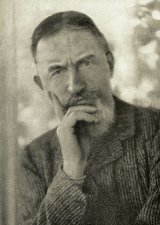Pygmalion Page #18
Pygmalion is a play by George Bernard Shaw, named after a Greek mythological figure. It was first presented on stage to the public in 1913. In ancient Greek mythology, Pygmalion fell in love with one of his sculptures, which then came to life.
Eliza smiles for the first time; expresses her feelings by a wild pantomime in which an imitation of Higgins's exit is confused with her own triumph; and finally goes down on her knees on the hearthrug to look for the ring. ACT V Mrs. Higgins's drawing-room. She is at her writing-table as before. The parlor-maid comes in. THE PARLOR-MAID [at the door] Mr. Henry, mam, is downstairs with Colonel Pickering. MRS. HIGGINS. Well, show them up. THE PARLOR-MAID. They're using the telephone, mam. Telephoning to the police, I think. MRS. HIGGINS. What! THE PARLOR-MAID [coming further in and lowering her voice] Mr. Henry's in a state, mam. I thought I'd better tell you. MRS. HIGGINS. If you had told me that Mr. Henry was not in a state it would have been more surprising. Tell them to come up when they've finished with the police. I suppose he's lost something. THE PARLOR-MAID. Yes, maam [going]. MRS. HIGGINS. Go upstairs and tell Miss Doolittle that Mr. Henry and the Colonel are here. Ask her not to come down till I send for her. THE PARLOR-MAID. Yes, mam. Higgins bursts in. He is, as the parlor-maid has said, in a state. HIGGINS. Look here, mother: here's a confounded thing! MRS. HIGGINS. Yes, dear. Good-morning. [He checks his impatience and kisses her, whilst the parlor-maid goes out]. What is it? HIGGINS. Eliza's bolted. MRS. HIGGINS [calmly continuing her writing] You must have frightened her. HIGGINS. Frightened her! nonsense! She was left last night, as usual, to turn out the lights and all that; and instead of going to bed she changed her clothes and went right off: her bed wasn't slept in. She came in a cab for her things before seven this morning; and that fool Mrs. Pearce let her have them without telling me a word about it. What am I to do? MRS. HIGGINS. Do without, I'm afraid, Henry. The girl has a perfect right to leave if she chooses. HIGGINS [wandering distractedly across the room] But I can't find anything. I don't know what appointments I've got. I'm-- [Pickering comes in. Mrs. Higgins puts down her pen and turns away from the writing-table]. PICKERING [shaking hands] Good-morning, Mrs. Higgins. Has Henry told you? [He sits down on the ottoman]. HIGGINS. What does that ass of an inspector say? Have you offered a reward? MRS. HIGGINS [rising in indignant amazement] You don't mean to say you have set the police after Eliza? HIGGINS. Of course. What are the police for? What else could we do? [He sits in the Elizabethan chair]. PICKERING. The inspector made a lot of difficulties. I really think he suspected us of some improper purpose. MRS. HIGGINS. Well, of course he did. What right have you to go to the police and give the girl's name as if she were a thief, or a lost umbrella, or something? Really! [She sits down again, deeply vexed]. HIGGINS. But we want to find her. PICKERING. We can't let her go like this, you know, Mrs. Higgins. What were we to do? MRS. HIGGINS. You have no more sense, either of you, than two children. Why-- The parlor-maid comes in and breaks off the conversation. THE PARLOR-MAID. Mr. Henry: a gentleman wants to see you very particular. He's been sent on from Wimpole Street. HIGGINS. Oh, bother! I can't see anyone now. Who is it? THE PARLOR-MAID. A Mr. Doolittle, Sir. PICKERING. Doolittle! Do you mean the dustman? THE PARLOR-MAID. Dustman! Oh no, sir: a gentleman. HIGGINS [springing up excitedly] By George, Pick, it's some relative of hers that she's gone to. Somebody we know nothing about. [To the parlor-maid] Send him up, quick. THE PARLOR-MAID. Yes, Sir. [She goes]. HIGGINS [eagerly, going to his mother] Genteel relatives! now we shall hear something. [He sits down in the Chippendale chair]. MRS. HIGGINS. Do you know any of her people? PICKERING. Only her father: the fellow we told you about. THE PARLOR-MAID [announcing] Mr. Doolittle. [She withdraws]. Doolittle enters. He is brilliantly dressed in a new fashionable frock-coat, with white waistcoat and grey trousers. A flower in his buttonhole, a dazzling silk hat, and patent leather shoes complete the effect. He is too concerned with the business he has come on to notice Mrs. Higgins. He walks straight to Higgins, and accosts him with vehement reproach. DOOLITTLE [indicating his own person] See here! Do you see this? You done this. HIGGINS. Done what, man? DOOLITTLE. This, I tell you. Look at it. Look at this hat. Look at this coat. PICKERING. Has Eliza been buying you clothes? DOOLITTLE. Eliza! not she. Not half. Why would she buy me clothes? MRS. HIGGINS. Good-morning, Mr. Doolittle. Won't you sit down? DOOLITTLE [taken aback as he becomes conscious that he has forgotten his hostess] Asking your pardon, ma'am. [He approaches her and shakes her proffered hand]. Thank you. [He sits down on the ottoman, on Pickering's right]. I am that full of what has happened to me that I can't think of anything else. HIGGINS. What the dickens has happened to you? DOOLITTLE. I shouldn't mind if it had only happened to me: anything might happen to anybody and nobody to blame but Providence, as you might say. But this is something that you done to me: yes, you, Henry Higgins. HIGGINS. Have you found Eliza? That's the point. DOOLITTLE. Have you lost her? HIGGINS. Yes. DOOLITTLE. You have all the luck, you have. I ain't found her; but she'll find me quick enough now after what you done to me. MRS. HIGGINS. But what has my son done to you, Mr. Doolittle? DOOLITTLE. Done to me! Ruined me. Destroyed my happiness. Tied me up and delivered me into the hands of middle class morality. HIGGINS [rising intolerantly and standing over Doolittle] You're raving. You're drunk. You're mad. I gave you five pounds. After that I had two conversations with you, at half-a-crown an hour. I've never seen you since. DOOLITTLE. Oh! Drunk! am I? Mad! am I? Tell me this. Did you or did you not write a letter to an old blighter in America that was giving five millions to found Moral Reform Societies all over the world, and that wanted you to invent a universal language for him? HIGGINS. What! Ezra D. Wannafeller! He's dead. [He sits down again carelessly]. DOOLITTLE. Yes: he's dead; and I'm done for. Now did you or did you not write a letter to him to say that the most original moralist at present in England, to the best of your knowledge, was Alfred Doolittle, a common dustman. HIGGINS. Oh, after your last visit I remember making some silly joke of the kind. DOOLITTLE. Ah! you may well call it a silly joke. It put the lid on me right enough. Just give him the chance he wanted to show that Americans is not like us: that they recognize and respect merit in every class of life, however humble. Them words is in his blooming will, in which, Henry Higgins, thanks to your silly joking, he leaves me a share in his Pre-digested Cheese Trust worth three thousand a year on condition that I lecture for his Wannafeller Moral Reform World League as often as they ask me up to six times a year.
Translation
Translate and read this book in other languages:
Select another language:
- - Select -
- 简体中文 (Chinese - Simplified)
- 繁體中文 (Chinese - Traditional)
- Español (Spanish)
- Esperanto (Esperanto)
- 日本語 (Japanese)
- Português (Portuguese)
- Deutsch (German)
- العربية (Arabic)
- Français (French)
- Русский (Russian)
- ಕನ್ನಡ (Kannada)
- 한국어 (Korean)
- עברית (Hebrew)
- Gaeilge (Irish)
- Українська (Ukrainian)
- اردو (Urdu)
- Magyar (Hungarian)
- मानक हिन्दी (Hindi)
- Indonesia (Indonesian)
- Italiano (Italian)
- தமிழ் (Tamil)
- Türkçe (Turkish)
- తెలుగు (Telugu)
- ภาษาไทย (Thai)
- Tiếng Việt (Vietnamese)
- Čeština (Czech)
- Polski (Polish)
- Bahasa Indonesia (Indonesian)
- Românește (Romanian)
- Nederlands (Dutch)
- Ελληνικά (Greek)
- Latinum (Latin)
- Svenska (Swedish)
- Dansk (Danish)
- Suomi (Finnish)
- فارسی (Persian)
- ייִדיש (Yiddish)
- հայերեն (Armenian)
- Norsk (Norwegian)
- English (English)
Citation
Use the citation below to add this book to your bibliography:
Style:MLAChicagoAPA
"Pygmalion Books." Literature.com. STANDS4 LLC, 2025. Web. 11 Jan. 2025. <https://www.literature.com/book/pygmalion_78>.




Discuss this Pygmalion book with the community:
Report Comment
We're doing our best to make sure our content is useful, accurate and safe.
If by any chance you spot an inappropriate comment while navigating through our website please use this form to let us know, and we'll take care of it shortly.
Attachment
You need to be logged in to favorite.
Log In